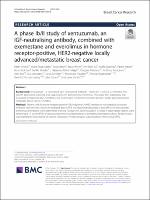| dc.contributor | Vall d'Hebron Barcelona Hospital Campus |
| dc.contributor.author | Sablin, Marie-Paule |
| dc.contributor.author | Bergh, Jonas |
| dc.contributor.author | Lu, Yen-Shen |
| dc.contributor.author | Martínez, Noelia |
| dc.contributor.author | Cortés Castan, Javier |
| dc.contributor.author | Schmid, Peter |
| dc.contributor.author | Im, Seock-Ah |
| dc.date.accessioned | 2021-06-29T10:09:04Z |
| dc.date.available | 2021-06-29T10:09:04Z |
| dc.date.issued | 2021-01-15 |
| dc.identifier.citation | Schmid P, Sablin MP, Bergh J, Im SA, Lu YS, Martínez N, et al. A phase Ib/II study of xentuzumab, an IGF-neutralising antibody, combined with exemestane and everolimus in hormone receptor-positive, HER2-negative locally advanced/metastatic breast cancer. Breast Cancer Res. 2021 Jan 15;23:8. |
| dc.identifier.issn | 1465-542X |
| dc.identifier.uri | https://hdl.handle.net/11351/6097 |
| dc.description | Breast cancer; HER2-negative; Hormone receptor-positive |
| dc.description.abstract | Background
Xentuzumab—a humanised IgG1 monoclonal antibody—binds IGF-1 and IGF-2, inhibiting their growth-promoting signalling and suppressing AKT activation by everolimus. This phase Ib/II exploratory trial evaluated xentuzumab plus everolimus and exemestane in hormone receptor-positive, locally advanced and/or metastatic breast cancer (LA/MBC).
Methods
Patients with hormone receptor-positive/HER2-negative LA/MBC resistant to non-steroidal aromatase inhibitors were enrolled. Maximum tolerated dose (MTD) and recommended phase II dose (RP2D) of xentuzumab/everolimus/exemestane were determined in phase I (single-arm, dose-escalation). In phase II (open-label), patients were randomised 1:1 to the RP2D of xentuzumab/everolimus/exemestane or everolimus/exemestane alone. Randomisation was stratified by the presence of visceral metastases. Primary endpoint was progression-free survival (PFS).
Results
MTD was determined as xentuzumab 1000 mg weekly plus everolimus 10 mg/day and exemestane 25 mg/day. A total of 140 patients were enrolled in phase II (70 to each arm). Further recruitment was stopped following an unfavourable benefit-risk assessment by the internal Data Monitoring Committee appointed by the sponsor. Xentuzumab was discontinued; patients could receive everolimus/exemestane if clinically indicated. Median PFS was 7.3 months (95% CI 3.3–not calculable) in the xentuzumab/everolimus/exemestane group and 5.6 months (3.7–9.1) in the everolimus/exemestane group (hazard ratio 0.97, 95% CI 0.57–1.65; P = 0.9057). In a pre-specified subgroup of patients without visceral metastases at screening, xentuzumab/everolimus/exemestane showed evidence of PFS benefit versus everolimus/exemestane (hazard ratio 0.21 [0.05–0.98]; P = 0.0293). Most common any-cause adverse events in phase II were diarrhoea (29 [41.4%] in the xentuzumab/everolimus/exemestane group versus 20 [29.0%] in the everolimus/exemestane group), mucosal inflammation (27 [38.6%] versus 21 [30.4%]), stomatitis (24 [34.3%] versus 24 [34.8%]), and asthenia (21 [30.0%] versus 24 [34.8%]).
Conclusions
Addition of xentuzumab to everolimus/exemestane did not improve PFS in the overall population, leading to early discontinuation of the trial. Evidence of PFS benefit was observed in patients without visceral metastases when treated with xentuzumab/everolimus/exemestane, leading to initiation of the phase II XENERA™-1 trial (NCT03659136). |
| dc.language.iso | eng |
| dc.publisher | BMC |
| dc.relation.ispartofseries | Breast Cancer Research;23 |
| dc.rights | Attribution 4.0 International |
| dc.rights.uri | http://creativecommons.org/licenses/by/4.0/ |
| dc.source | Scientia |
| dc.subject | Medicaments - Eficàcia |
| dc.subject | Mama - Càncer - Tractament |
| dc.subject.mesh | Breast Neoplasms |
| dc.subject.mesh | Drug Therapy, Combination |
| dc.subject.mesh | Treatment Outcome |
| dc.title | A phase Ib/II study of xentuzumab, an IGF-neutralising antibody, combined with exemestane and everolimus in hormone receptor-positive, HER2-negative locally advanced/metastatic breast cancer |
| dc.type | info:eu-repo/semantics/article |
| dc.identifier.doi | 10.1186/s13058-020-01382-8 |
| dc.subject.decs | neoplasias de la mama |
| dc.subject.decs | farmacoterapia combinada |
| dc.subject.decs | resultado del tratamiento |
| dc.relation.publishversion | https://breast-cancer-research.biomedcentral.com/articles/10.1186/s13058-020-01382-8 |
| dc.type.version | info:eu-repo/semantics/publishedVersion |
| dc.audience | Professionals |
| dc.contributor.organismes | Institut Català de la Salut |
| dc.contributor.authoraffiliation | [Schmid P] Centre for Experimental Cancer Medicine, Barts Cancer Institute, Queen Mary University of London, London, UK. [Sablin MP] Department of Drug Development and Innovation, Institut Curie, Paris, France. [Bergh J] Department of Oncology-Pathology, Karolinska Institutet and Breast Cancer Centre, Cancer Theme, Karolinska University Hospital, Stockholm, Sweden. [Im SA] Department of Internal Medicine, Seoul National University Hospital, Cancer Research Institute, Seoul National University College of Medicine, Seoul, South Korea. [Lu YS] Department of Oncology, National Taiwan University Hospital, Taipei, Taiwan. [Martínez N] Department of Oncology, Ramon y Cajal University Hospital, Madrid, Spain. [Cortés J] Breast Cancer Group, Vall d’Hebron Institute of Oncology (VHIO), Barcelona, Spain. Department of Oncology, IOB Institute of Oncology, Quironsalud Group, Madrid and Barcelona, Spain |
| dc.identifier.pmid | 33451345 |
| dc.identifier.wos | 000608053300001 |
| dc.rights.accessrights | info:eu-repo/semantics/openAccess |

